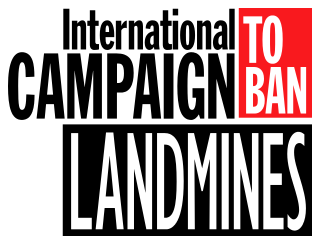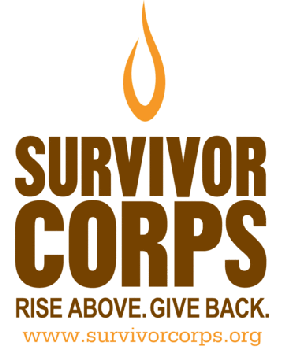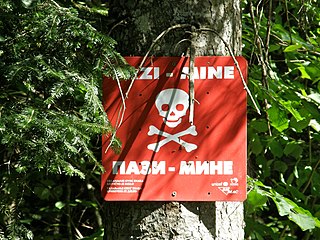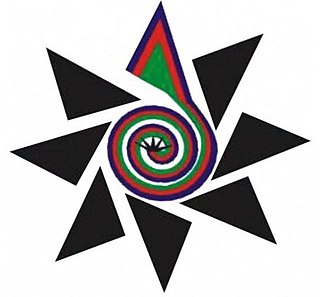
The International Campaign to Ban Landmines (ICBL) is a coalition of non-governmental organizations whose stated objective is a world free of anti-personnel mines and cluster munitions, where mine and cluster munitions survivors see their rights respected and can lead fulfilling lives.

The HALO Trust is a humanitarian non-government organisation which primarily works to clear landmines and other explosive devices left behind by conflicts. With over 10,000 staff worldwide, HALO has operations in 28 countries. Its largest operation is in Afghanistan, where the organization continues to operate under the Taliban regime that took power in August 2021.

The Convention on the Prohibition of the Use, Stockpiling, Production and Transfer of Anti-Personnel Mines and on their Destruction of 1997, known informally as the Ottawa Treaty, the Anti-Personnel Mine Ban Convention, or often simply the Mine Ban Treaty, aims at eliminating anti-personnel landmines (APLs) around the world.

Survivor Corps, formerly known as the Landmine Survivors Network, was a global network of survivors helping survivors to recover from war, rebuild their communities, and break cycles of violence. The organization operated programs in Albania, Armenia, Azerbaijan, Bosnia-Herzegovina, Burundi, Colombia, Croatia, El Salvador, Ethiopia, Georgia, Jordan, Kosovo, Macedonia, Montenegro, Serbia, Uganda, Rwanda, the United States and Vietnam.
The Cluster Munition Coalition (CMC) is an international civil society movement, which campaigns against the use, production, stockpiling, and transfer of cluster munitions. Cluster munitions, a type of munition stockpiled by more than 80 states, are documented to have caused significant civilian deaths and injuries and have frequently caused indiscriminate effects in both conflict and peace times. Their use is prohibited under the 2008 Convention on Cluster Munitions, a convention formally endorsed on May 30, 2008, in Dublin, Ireland, and was signed by 94 countries in Oslo on December 3-4, 2008. The Convention entered into force, becoming binding upon state parties to the convention on August 1, 2010, after 30 countries formally ratified it. As of January 4, 2012, it had been signed by 111 countries, of which 77 have ratified.
FSD is a Swiss non-governmental organisation specialising in mine action. Since its creation in 1997, FSD has carried out operations in some 30 countries on four continents. Its programmes include the following four components: humanitarian demining, explosive ordnance risk education, victim assistance, and stockpile destruction and management. In 26 years, more than 1.4 million items of explosive ordnance have been neutralised by FSD.
A mine clearance organization, or demining organization, is an organization involved in the removal of landmines and unexploded ordnance (UXO) for military, humanitarian, or commercial reasons. Demining includes mine clearance, as well as surveying, mapping and marking of hazardous areas.
The Geneva International Centre for Humanitarian Demining is an international organisation working in mine action and explosive ordnance risk reduction, with a focus on landmines, cluster munitions and ammunition stockpiles. Based in the Maison de la paix in Geneva, it is legally a non-profit foundation in Switzerland.

Kenneth R. Rutherford is the co-founder of the Survivor Corps, a group that helps the victims of war, and an American researcher in the field of political science. He is also a member of the International Campaign to Ban Landmines, which was the recipient of the 1997 Nobel Peace Prize. Rutherford has served as the Director of the James Madison University Center for International Stabilization and Recovery, a Peace Corps Volunteer in Mauritania (1987-1989), a UNHCR Emergency Refugee Coordinator in Senegal (1989), and a humanitarian emergency relief officer in northern Kenya and Somalia (1993). In 2024, Rutherford taught at Hue University in Vietnam as a Fulbright Scholar Fellow.
Mine action is a combination of humanitarian aid and development studies that aims to remove landmines and reduce the social, economic and environmental impact of them and the explosive remnants of war (ERW).
The Swiss Campaign to Ban Landmines is a member of the International Campaign to Ban Landmines (ICBL). It is an umbrella organisation composed of about 50 Swiss NGOs gathered around the common objective of banning antipersonnel landmines and similar indiscriminate weapons. At the national level, the Swiss Campaign to Ban Landmines successfully advocated in favor of a national ban of antipersonnel landmines and of Switzerland’s signature and ratification of the Ottawa Treaty in 1995-1997. Within the ICBL, the Swiss Campaign was a member of the Non State Actors Working Group, which it co-chaired until the end of 2004.

The Mines Advisory Group (MAG) is a non-governmental organization that assists people affected by landmines, unexploded ordnance, and small arms and light weapons.

Land mine contamination in Bosnia and Herzegovina is a serious aftereffect of the Bosnian War, which took place from 1992 until 1995. During this time period, all 3 conflicting factions planted land mines near the current-day political entity borders. As a result, the country has had the most severe land mine problems in the world. Although landmine removal efforts have made progress throughout the country and the landmine-related deaths have steadily decreased each year, many people are still killed or suffer injuries caused by unexploded munitions in Bosnia and Herzegovina. Despite the threat of landmines, people enter contaminated areas out of economic necessity.
The Uganda Landmine Survivors Association (ULSA) is a non-governmental organization, focused primarily on advocacy and victim assistance throughout Uganda. The organization was founded in April 2005 in order to campaign against the use, production and transfer of landmines, cluster munitions and explosive remnants of war (ERWs). ULSA also serves as a peer to peer support network for survivors, providing them with training in vocational, leadership and advocacy skills in partnership with other organizations throughout Northern and Western Uganda.

The United Nations Mine Action Service (UNMAS) is a service located within the United Nations Department of Peacekeeping Operations that specializes in coordinating and implementing activities to limit the threat posed by mines, explosive remnants of war and improvised explosive devices.
Golden West Humanitarian Foundation is an American Non-profit (501C3) organisation that develops technology to address the technical limitations of humanitarian mine clearance. The Golden West Humanitarian Foundation is based in Woodland Hills, Los Angeles, California.

The Center for International Stabilization and Recovery (CISR), formerly the Mine Action Information Center (MAIC), is a public policy center at James Madison University that manages information, conducts training, holds conferences and workshops, and performs research relevant to humanitarian mine clearance, victim assistance, mine risk reduction and other explosive remnants of war (ERW).
Gender mainstreaming in mine action is the application of gender mainstreaming to mine action. It is increasingly being adopted by international and state mine action organizations.
The Organization of Amputees Republike Srpske (UDAS) is registered as a nonprofit organization and non-governmental organization based in Banja Luka, Bosnia and Herzegovina (BiH), founded by amputees which are mostly landmine victims in order to provides support for victims of landmines, unexploded ordnance (UXO), cluster munition and other persons with disabilities and their families to integrate them back into the community, thus enabling them to live normal lives.

Azerbaijan National Agency for Mine Action (ANAMA) is a mine action agency and executive body under State Commission for Reconstruction and Rehabilitation of War-Affected Areas of the Republic of Azerbaijan. The agency is accountable for implementing all necessary procedures corresponding to Azerbaijan Mine Action Program in order to decontaminate mines within the territory of Azerbaijan. Donors of the agency are government of Azerbaijan ($2,400,000) and UNDP ($160,000).










